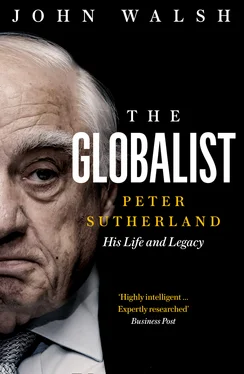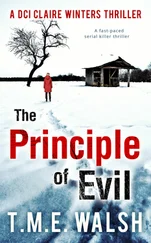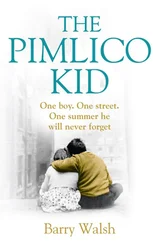Bobby McDonagh was a former student at Gonzaga, although he entered the school eight years after Sutherland. He would become one of Ireland’s most distinguished diplomats, and as Irish ambassador to the UK had close contact with Sutherland. They often discussed Fr Veale. McDonagh wrote an appreciation following Veale’s death which appeared in the Sunday Independent newspaper on 4 November 2002:
I remember Joe once saying that he believed in Christ rather than in Christianity. In making this distinction (‘don’t make a dichotomy out of a distinction’ I still hear him saying), he was, of course, distinguishing the essence of faith from what is secondary. He promoted, with his formidable intellect and indeed the commitment of his life, the essentials of his faith. But beyond that his commitment to seeking the truth in all its paradox and complexity obliged him to have an open mind. He long recognised, for example, the central importance of women, especially mothers, in the church, as necessary leaders of opinion rather than as flower arrangers. He saw that the church urgently needs the involvement of the laity, as players rather than as cheer leaders. Tolerance of difference was at the heart of his belief.[3]
Fr Barber recalled that Sutherland hadn’t stood out as having a deeper faith than any other boy in Gonzaga at the time. ‘That became evident in later life. His last act was going to mass. His faith became evident in other ways, for example with migrants, and being involved with the Vatican.’ According to Barrington, many of the nostrums that shaped Sutherland’s life and career came from Gonzaga and the Jesuits. ‘He was a liberal. He thought that by being liberal you helped people be better off and have a better life. That would have been a Gonzaga principle. Here were the Jesuits in a very rigid church and they were much more liberal than the rest of the church and that came through in Gonzaga people.’ Friends say even though religion was very important to Sutherland throughout his life, he practised his faith privately and did not force his views on anybody else. His views were much more nuanced and progressive than he was sometimes given credit for.
In those days, boys attending Gonzaga did not have to gain the Leaving Certificate. Instead they took a matriculation exam and a sixth year, a pre-university year, on which great value was placed.[fn1] Matriculation was a separate set of exams used as a means to gain entrance to university, and was scrapped only in 1992, after eighty-two years. The idea of not taking the Leaving Certificate was to assert that what mattered was learning, not passing exams. Such an ethos was very strong when Sutherland was at the school, and it played a large part in shaping him in later life. According to Fr Barber it wasn’t just about attainment, it was about ideals and values. Although Sutherland’s matriculation was mediocre, ‘I think he realised that even though he mightn’t have worked very hard, an intellectual light was sparked. I think that really impressed him and he was always very generous to the school. He attributed what he got here to the Jesuits. They were very formative years for him, much more so than we thought at the time.’
In Barrington’s view, the most important quality Sutherland took from Gonzaga was self-confidence: ‘Gonzaga taught you to be self-confident. In my class everybody went to college. It was expected. You weren’t going to join an insurance firm or anything like that. At Gonzaga you did feel special and when you went to college you did feel prepared for this.’
SUTHERLAND WENT TO UNIVERSITY COLLEGEDublin in 1964 to study law. But then again, he was hardly faced with an array of choices. Trinity College Dublin, academically superior at the time and with more of an international reputation, was out of bounds for young ambitious Catholics. Archbishop John Charles McQuaid, who had prevented Sutherland from playing rugby against Protestants, had also made an order that young Catholics were barred from entering Trinity, which had a Protestant ethos.
By that stage, Sutherland knew he wanted to become a lawyer, and that left him with one choice. In the 1960s, UCD was located in Earlsfort Terrace, now the site of the National Concert Hall, just off Stephen’s Green in the centre of Dublin. At Gonzaga, Sutherland had been able to seamlessly mix his two passions, debating and rugby; but at university, some tough choices had to be made.
The Literary & Historical Society (L&H) had been founded in 1854 by Cardinal John Henry Newman. To become auditor of the L&H was seen as a rite of passage for any young person who had intentions of shaping Irish society, or at the very least becoming rich and famous. Patrick (Paddy) Cosgrave was auditor of the L&H when Sutherland arrived on the campus in 1964. Cosgrave was something of an anomaly. UCD, along with wider Irish society, was becoming more comfortable with its nationalist past. Like their counterparts throughout Europe, Irish students were on the march leftwards.
Cosgrave was very much to the right and revelled in the label ‘west Brit’, a pejorative term used to describe anybody still well disposed to Ireland’s former colonial masters. He used to boast that his grandfather, a warden in Kilmainham Jail, had beaten up a young Kevin Barry, a Republican martyr. Following UCD, Cosgrave moved to London, where he plied his trade as a journalist before catching the eye of Margaret Thatcher. He went on to become a special adviser to the former British prime minister, although she cut ties with him when his drinking got out of control. He died in 2001 aged sixty.
Sutherland had shown no overt political leanings at that stage. Friends say he had no appearance of struggling for too long, if at all, with the choice of spending Saturday nights in the company of Cosgrave et al. in the L&H or the ‘hop’ at the Lansdowne rugby club. Neither was he active in politics at UCD, where many prominent members of Fine Gael – such as John Bruton, who was a few years behind Sutherland at college – were taking their first tentative steps towards elected office.
In those days, students took their degrees and Bar exams at the same time. Sutherland was awarded a law degree in 1967 and passed his Bar exams a year later.
In Sutherland’s last year at UCD, Vincent Browne became the chairman of Young Fine Gael. Browne would later become a prominent journalist and harsh critic of the party. Rugby remained an all-consuming passion for Sutherland at UCD, yet he still found time to increase his circle of friends. Garrett Sheehan, Colm Barrington and other Gonzaga boys had made the same journey from Ranelagh to Earlsfort Terrace, although Barrington, being a year older and in the economics department, spent little time with Sutherland at UCD. Barrington was not a fan of his university experience. ‘UCD felt very old fashioned. Having come from Gonzaga it felt in some ways silly. Girls were not allowed to wear trousers into the library. The pomposity of some of the lecturers was unbearable.’
Sutherland appeared to develop no strong feelings about his time at Earlsfort Terrace. Nicholas Kearns, who also studied law with Sutherland – they both started at the Bar on the same day – would go on to become a Supreme Court judge and president of the High Court. He and Sutherland met the summer before they started at UCD. ‘I first met him when thirty-five lads went to Huntingdon in the UK for a summer to work for Batchelors Peas. Peter quickly emerged as the natural leader of the Irish group that was there. It was eight weeks of night shifts, eight at night to eight in the morning. We were all Irish guys from different backgrounds. If there were any workplace difficulties, Suds [Sutherland] sorted them out. He was big and strong in those days. He had a natural strength and energy. If he wanted something he got it.’ ‘Suds’ was a nickname that would remain with Sutherland for the rest of his life.
Читать дальше












